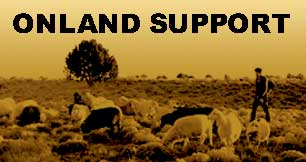VOICES FROM CACTUS VALLEY, RED WILLOW SPRINGS AND UPPER BIG MOUNTAIN PLATEAU
November 11, 2000 by pathfinder
Filed under Voices from the Land
(November 2000)
[These are excerpts from recent discussions among traditional resisters which has been formulated into this ‘crude-sort-of’ article. However, it is intended to shed light into the feelings and current outlook about the situations on the land.]
For those concerned people who wish to know how we are doing or what we plan to do about the U.S. Attorney Office’s intention of evicting us, we like for you to know that our plans are still the same: we wish to remain on our ancestral lands and will have no thoughts of moving elsewhere. We wish to carrying on with our cultural life, as usually, despite the difficulties of old age and with the limitation in physical capabilities. We will continue to walk our sheep and try our very best to stay warm this winter. We can only think positively about what we can manage around our current home sites and land. That will be our plan and strategy, but the rest will be up to the Great Spirits –they will have the ultimate answer, in the end, about the Earth’s destiny. How long can our society be under oppression? It is certainly not indefinite that, the oppressor will allow itself to torture our lives –it will come to an end, eventually.
The land is necessary for our culture, religion and language to remain in existence. Without our ancestral lands, we can no longer be the traditional Dineh or have an identity which is authentically indigenous. Yes, we all have many grandchildren, but when they all speak nothing but the English language, this makes our future as a Dineh culture become hopeless. Then, if we wish to continue the revival of our culture and language among the future generations, we need the land! As resistors, we like to help these younger generations to appreciate these lands and have them become aware of the traditions, but these new, younger generation lack any interest or curiosity about the land or our traditions. We love all our grandchildren and great grandchildren deeply, and it hurts us to see them lack any interest for our history on these lands or lack the concern for that we might lose these lands, someday. We cannot blame all this on them because we realize that they are the third and fourth generation raised by the American school systems.
The new, younger generations do come around to visit and stay with us, but they do not want to involve themselves in the chores around our homes. They don’t want to help fetch the sheep or try learning how to chop wood. We see them get completely bored and restless. Sometimes they will tell their parents that, “it’s boring, here!” Then, they can’t wait to return back to the modern neighborhoods. The new generation are only happy with the modern and materialistic things. The televisions and the electronic games gives them the only interest about learning. Those types of illusions and materialistic past time is Life to them. The land, the open fresh air and the animals means nothing to them, andthat is why they are bored when they come to visit us. These new generation don’t appreciate our food as well. We like to butcher meat for them so they can eat healthy, but they rather open a bag of chips and a soda rather than eating some home-grown mutton. This just breaks our hearts that our traditional world means nothing to the modern generations.
We are very old, now, and there aren’t much we can do to change these offset minds. We, as elders, can only uphold the laws of the earth and the universe for the sake of all humanity. That is why we have decided to resist relocation. Some of us were tricked into signing a Lease Agreement, and some of us didn’t sign are, now, facing forcible eviction, but we all still feel the same towards our mother, here, the Woman Mountain. Though the struggle, here, might seem bleak, it is encouraging to see the non-Indian supporters live with us. These non-Indians, some of them, are interested in herding sheep, chopping wood, learning the language, preparing the corn or the mutton, and willing to try all the necessary methods of labor-work around our home sites. It is encouraging, also, because it used to be mentioned in the old times that the White Nation was created by the same Great Spirits who created the Dineh. So, they are kin, and we think this why the elder women resistors often refer to the non-Indian supporters as their children.
It is like they (the BIA) are trying to break us or tame us. They forced us into signing the Accommodation Agreement, and now, they send their police to inform us, “you have too many animals, again, so please, kindly get rid of them by selling them, graze them elsewhere besides HPL or else, we will confiscate them.” We have heard this over and over for years now, but (they) will not ever see that we don’t care about their grazing policies or any other anti-Dineh policies.We will continue to have the joy of raising the animals, and so that, we can use them to weave, to maintain our traditional cultural life and to use them for our food and medicine. The more they try to break us the more we shall refuse to acknowledge that ‘paper’ which states that we have a Lease. The Accommodation Agreement is no privilege because we are forced to move our animals around, and we are very tired of the expenses for checking on our animals out at the Winslow Tract and are tired of paying for the grazing fees. The Arizona Bureau of Land Management are charging us about $300 to $400 per month to have our cattle graze near Winslow. Then, they want us to always meet all the rest of the criteria like veterinarian expenses and verifications of ownerships. It is a nonstop effort to keep our cattle alive in a range that is about 150 miles from here. I sometimes feel, ‘the heck with all this,’ and I like to just bring them back out here and grazing them, here, ‘illegally.’
It is a good idea, and it is time that, we try to return this situation or issue back to being an ‘Indian Issue.’ We have just allowed certain non-Indians to be the experts for our struggle or that, we have allowed them to make critical decisions without our knowledge. Certain non-Indians have come here to support us, with good intentions, but have unfortunately only brought further confusion and divisions. They have only shown us how ignorant they are when we try to tell them otherwise. They will run and hide elsewhere and continue their misrepresentation. We are hopeful that other Indians, now, wishing to help us, and that we like to see that come to reality –the way it was when we worked with the traditional Hopis and other indigenous nations. Our resistance has much better force when other indigenous nations align with us, and we are able to function more effectively at the international level. Thus, if we maintain and present our issues within the international forum, our issues are combined with other indigenous issues of human rights and treaty rights.
We have relied on many attorneys who have made only promises as we have lost more without those promises being fulfilled. If we turn to our indigenous people, there are better hopes for getting adequate legal representation for these international participation. It is vital that we must maintain our issues within the realm of the United Nations Commission on Human Rights and the Working Groups for the Indigenous Populations. So, we invite the willingness of those indigenous legal experts and researchers to begin working with us. But we, the Dineh resistors, will have do our part to make this happen. We know that some of our non-Indian supporters have always believe in our voices of resistance, that it should remain as an Indian Issue. The International Indian Treaty Council has never given up on us, and they have assisted us tremendously in keeping our issues a float within the international and global dialogues.
Though, we lack many resources and at the same time, we commit ourselves to this great endeavor of international representation, we will look to our indigenous relatives and to, also, rebuild a better and stronger working relationship with our non-Indian friends/supporters. Though, we are a small community up here, we certainly hope that the rest of the Big Mountain and other “HPL” communities and their spokes people will, somewhat, come to these terms.
END of Voices From Cactus Valley, Red Willow Springs and Upper Big Mtn. Plateau.
Thank you, supporters, for taking the time to read these foregoing words which I have recently translated from my visits to the People and the Land. Some of you are aware that, I am a very critical and an extreme advocate for the traditional knowledge of resistance, but I just want to let you all know that, I had no influence upon the wishes, hopes and intentions of these Elders who have spoken. However, I do agree and do hope that we all can IMMEDIATELY accept the realization of the issues and its outlook. Then, we can all heal and start a new day of working together.
Currently, we are still asking for supporters to spent time on the land for the purpose of understanding and working hard to help the resistors in maintaining their cultural survival. Work ‘parties’ to the land are also being organized, and we want to remind you that, your interest and considerations of ways to help are always invited. Information about Direct On-land support, and the education about the (real) issue of resistance are available, and you can contact myself or check-out www.supportblackmesa.org, and/or Call (928) 773-8086.
Bahe


